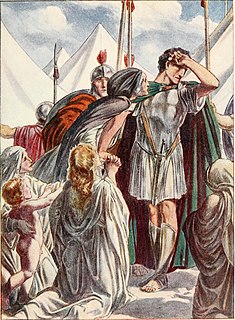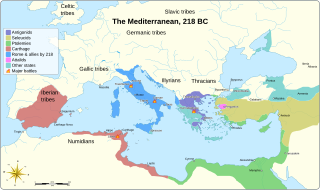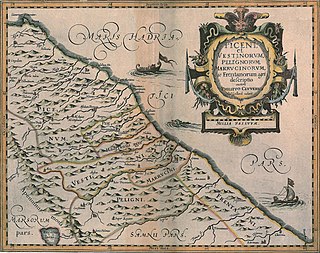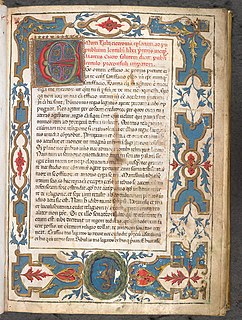
The gens Junia was one of the most celebrated families in Rome. The gens may originally have been patrician. The family was already prominent in the last days of the Roman monarchy. Lucius Junius Brutus was the nephew of Lucius Tarquinius Superbus, the seventh and last King of Rome, and on the expulsion of Tarquin in 509 BC, he became one of the first consuls of the Roman Republic.

The gens Pompeia was a plebeian family at ancient Rome, first appearing in history during the second century BC, and frequently occupying the highest offices of the Roman state from then until imperial times. The first of the Pompeii to obtain the consulship was Quintus Pompeius in 141 BC, but by far the most illustrious of the gens was Gnaeus Pompeius, surnamed Magnus, a distinguished general under the dictator Sulla, who became a member of the First Triumvirate, together with Caesar and Crassus. After the death of Crassus, the rivalry between Caesar and Pompeius led to the Civil War, one of the defining events of the final years of the Roman Republic.

The gens Marcia, occasionally written Martia, was one of the oldest and noblest houses at ancient Rome. They claimed descent from the second and fourth Roman Kings, and the first of the Marcii appearing in the history of the Republic would seem to have been patrician; but all of the families of the Marcii known in the later Republic were plebeian. The first to obtain the consulship was Gaius Marcius Rutilus in 357 BC, only a few years after the passage of the lex Licinia Sextia opened this office to the plebeians.
The gens Octavia was a plebeian family at Rome, which was raised to patrician status by Caesar during the first century BC. The first member of the gens to achieve prominence was Gnaeus Octavius Rufus, quaestor circa 230 BC. Over the following two centuries, the Octavii held many of the highest offices of the state; but the most celebrated of the family was Gaius Octavius, the grandnephew and adopted son of Caesar, who was proclaimed Augustus by the senate in 27 BC.
The gens Aelia, occasionally written Ailia, was a plebeian family in Rome, which flourished from the fifth century BC until at least the third century AD, a period of nearly eight hundred years. The archaic spelling Ailia is found on coins, but must not be confused with Allia, which is a distinct gens. The first member of the family to obtain the consulship was Publius Aelius Paetus in 337 BC.
The gens Asinia was a plebeian family at Ancient Rome, which rose to prominence during the first century BC. The first member of this gens mentioned in history is Herius Asinius, commander of the Marrucini during the Social War. The Asinii probably obtained Roman citizenship in the aftermath of this conflict, as they are mentioned at Rome within a generation, and Gaius Asinius Pollio obtained the consulship in 40 BC.
The gens Caesonia was a plebeian family of ancient Rome. They first appear in history during the late Republic, remaining on the periphery of the Roman aristocracy until the time of Nero. Another family of Caesonii attained the consulship several times beginning in the late second century; it is not clear how or whether they were related to the earlier Caesonii.
The gens Titia was a plebeian family at Rome. The gens is rarely mentioned in the Republican period, and did not rise out of obscurity till a very late time. None of its members obtained the consulship under the Republic, and the first person of the name who held this office was Marcus Titius in BC 31.

The gens Maria was a plebeian family of Rome. Its most celebrated member was Gaius Marius, one of the greatest generals of antiquity, and seven times consul.

The gens Sosia, occasionally written Sossia, was a plebeian family at ancient Rome. Members of this gens occur in history from the end of the Republic down to the third century AD. The first of the Sosii to attain the consulship was Gaius Sosius in 32 BC, and the family would continue holding various positions in the Roman state until the third century.
The gens Maecia was a plebeian family at Rome. Members of this gens are rarely mentioned before the time of Cicero, but in Imperial times they rose to prominence, achieving the consulship on at several occasions.
The gens Minicia was a plebeian family at Rome. Members of this gens are first mentioned in the first century, achieving the consulate under the emperor Claudius. Owing to the similarity of their names, the Minicii are regularly confused with members of the ancient and far more prominent gens Minucia.

The gens Munatia was a plebeian family at Rome. Members of this gens are first mentioned during the second century BC, but they did not obtain any of the higher offices of the Roman state until imperial times.

The gens Stertinia, was a plebeian family of ancient Rome. It first rose to prominence at the time of the Second Punic War, and although none of its members attained the consulship in the time of the Republic, a number of Stertinii were so honoured in the course of the first two centuries of the Empire.
The gens Novia was a minor plebeian family at Rome. Members of this gens first appear during the final century of the Republic, but the first of the Novii to obtain the consulship was Decimus Junius Novius Priscus in AD 78.
The gens Oppia was an ancient Roman family, known from the first century of the Republic down to imperial times. The gens may originally have been patrician, as they supplied priestesses to the College of Vestals at a very early date, but all of the Oppii known to history were plebeians. None of them obtained the consulship until imperial times.
The gens Passiena, occasionally written Passienia, Passenia, Passennia, or Passenna, was a plebeian family at Rome, originally of equestrian rank, but at least one member was later admitted to the patriciate. Members of this gens appear in history from the early years of the Empire down to the third century, and several obtained the consulship, beginning with Lucius Passienus Rufus in 4 BC.
Tiberius Catius Caesius Fronto was a Roman senator who was suffect consul in the nundinium September–December 96 with Marcus Calpurnius [...]icus as his colleague. These two consuls were presiding over the Roman Senate when the Emperor Domitian was assassinated, and Nerva elevated as emperor. Fronto was an acquaintance of Pliny the Younger, and he is mentioned as many as four times in the collected letters.
The gens Roscia, probably the same as Ruscia, was a plebeian family at ancient Rome. Members of this gens are mentioned as early as the fifth century BC, but after this time they vanish into obscurity until the final century of the Republic. A number of Roscii rose to prominence in imperial times, with some attaining the consulship from the first to the third centuries.
The gens Sallustia, occasionally written Salustia, was a plebeian family at ancient Rome. Members of this gens are first mentioned in the time of Cicero, and from that time they attained particular distinction as statesmen and writers. The most illustrious of the family was the historian Gaius Sallustius Crispus, who wrote valuable works on the Jugurthine War and the Conspiracy of Catiline, which still exist.















